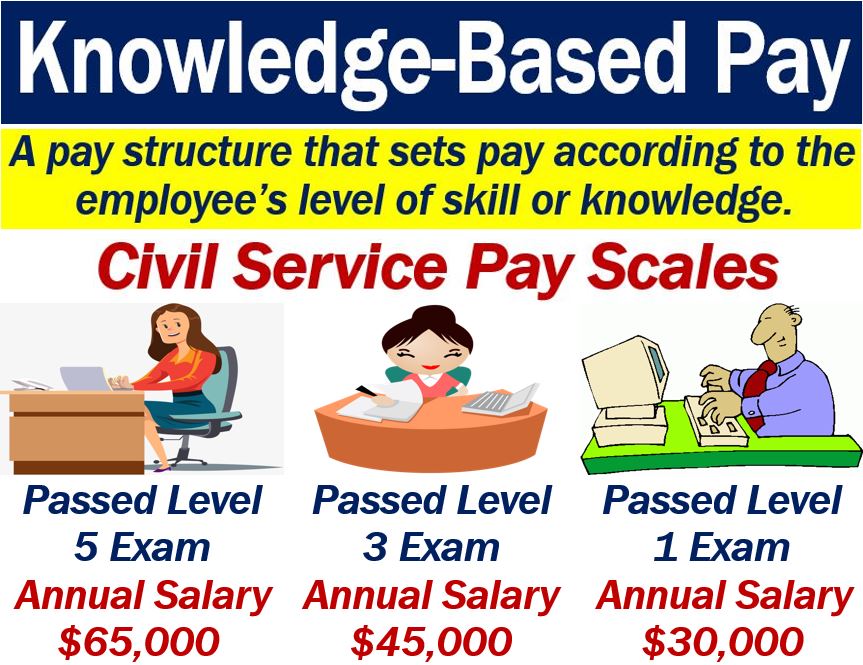Knowledge-based pay is a system in which workers’ salaries relate closely to their academic attainments and levels of skills. In other words, the more you know and can do, the more your employer will pay you. Knowledge-based pay focuses on employees’ ability to improve their education to increase their income. It is a system in which employers reward their workers for reaching specific goals in training and education. The employer also rewards them for improving their skills.
Knowledge-based pay aims to encourage workers to study more and improve their skill set.
As employees increase their scope for knowledge, their employer gives them more complicated projects to undertake. Subsequently, they earn more money. However, some employers pay more simply for having more qualifications.
Knowledge-based pay types
Some companies openly encourage their workers to train and study more. They tell them that if they train more, they will earn more.
Other companies, on the other hand, tend to reward a greater skill set with more responsibilities.
Consequently, the workers with better training earn more than their counterparts with fewer skills. However, these companies do not openly tell their employees to study and train more.

In some cases, the training may not include formal accredited courses. Sometimes, an outside consultant or trainer may come in to train a group of workers or an individual. They are subsequently rewarded for attending and passing the course.
Workers may also receive financial rewards for attending and passing in-house courses.
Job-based vs. knowledge-based pay
Knowledge-based pay is not the same as job-based pay. While the former rewards people for what they know, the latter rewards them according to their position in the company.
Let’s suppose ABC Cranes Inc. employs crane operators and crane cleaners. Jane is a crane operator, and Peter is a cleaner. Peter has a Ph.D. (doctorate) in mechanical engineering. Jane, however, never went to university. She has a crane operators diploma.
Jane earns $23 per hour while Peter earns just $10 per hour.
Peter and Jane work in a job-based pay system. Peter’s doctorate is making no difference to his income.
Some employers pay one person more than a colleague in the same position. They pay one person more because that person has a higher academic level. Many civil services across the world are like that.
There are some professions that only accept people with a qualification. For example, if you want to work as a medical doctor, you must first study medicine. Then, you need to get a medical licence.
Pros and cons
Some people argue in favor of knowledge-based pay while others are strongly against it.
Pros
Proponents of the system say that it encourages personal growth and development among employees. This can subsequently lead to improved performance across the entire company.
Proponents also argue that the system rewards ambitions staff who strive to perform at a higher level.
Cons
Critics of knowledge-based pay say that the system does not reflect what the employee is doing. They also argue that the system is more likely to lead to discriminatory pay practices.
Why should one person get more money than another person for doing exactly the same job? Shouldn’t the focus be on encouraging people to do a better job?
What do individuals prefer?
Most of us, when we assume the role of a private employer, opt for the job-based pay system. Let’s suppose you need to have somebody come in to mow your lawn. You place an advert in your local paper, and two people respond.
One person, Jack, says he will do the job for $50. He has ten references with their phone numbers. You call them all and they say that Jack is an excellent worker.
The other candidate, Tony, says he will do the job for $50 plus $10 because he has a degree in lawn science. He also has ten references. Five of the references are the same ones that Jack gave you.
You call those five references that the two candidates have in common. The references say that Jack and Tony’s levels of lawn mowing are identical. In other words, one is just as good as the other, i.e., neither is better than the other.
Which of the two candidates, Tony or Jack, are you more likely to contract to mow your lawn? Most of us would choose Jack because a degree in lawn science will make no difference to the result.
In other words, we tend to pay for the result. We are not usually willing to pay one person more because they are trying to improve themselves. We simply want to pay for the mowing of the lawn and nothing else.
However, we are usually willing to pay more for qualifications in some cases. For example, how much are we willing to pay for plumbing work in our home? We are usually willing to pay a qualified plumber more than a person with no plumbing qualifications.
